Dr. Robert R. Humphrey's Photos: change 1890-1985
of grasslands to desert by grazing, from his book "90 Years
and 535 Miles: Vegetation Changes Along the Mexican Border"
Copyright © 1987 published by the University of New Mexico
Press, photos and texts used with permission.
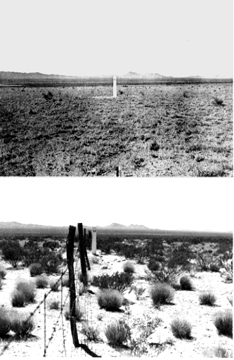
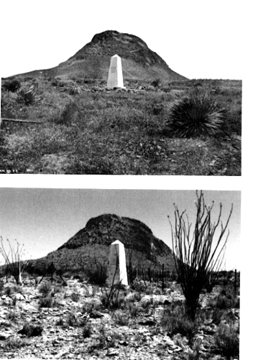
Left above: Monument No. 35 - Chihuahuan Desert. "The
vegetation here has changed drastically during the last ninety-two
years. What formerly appears to have been essentially a pure stand
of tobosagrass [Hilaria mutica] has now become an open mixture
of creosotebush and snakeweed, with no grass."
Right above: Monument No. 82 - Chihuahuan Desert. "The
ninety years that have elapsed since 1893 have shown a shift from
grasses with a very few scattered shrubs to shrubs and and halfshrubs
with no grasses."
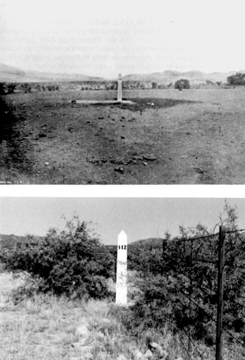
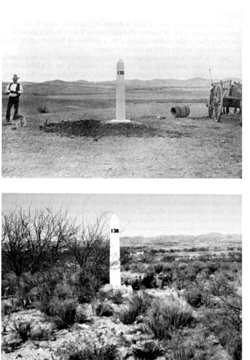
Left above: Monument No. 112 - Semidesert Grassland. "This
area, which I have designated semidesert grassland, is rapidly
being taken over by velvet mesquite and might, perhaps, be more
properly classified as savanna. An occasional Emory oak lends
variety to the mesquite. The oaks are probably about as abundant
as they were in the 1890's; the mesquite, in contrast, presents
a marked life-form change. What was essentially open grassland
has now become a mesquite-grass savanna in which the mesquites
are assuming an ever-increasing greater control. "
Right above: Monument No. 138 - Semidesert Grassland, Sonoran
Savanna. "There has been a major vegetational change
throughout this area during the last ninety years, a change evidenced
primarily by the invasion of mesquite, cacti, and other shrubs
and halfshrubs. At the time the monuments were erected, this was
open grassland free of scrub vegetation and with mesquite restricted
to the occasional drainage. When I first passed through here as
a graduate student in 1930, it was still essentially open, rolling
prairie grassland."
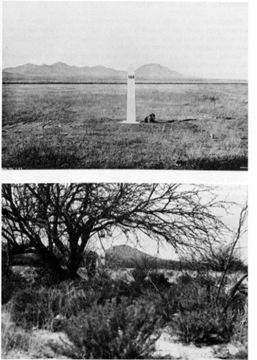
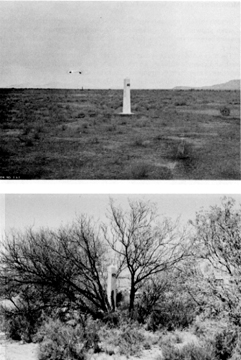
Left above: Monument 144 - Sonoran desert: "The
former open grassland, free of scrub vegetation except for the
long, dark streak in the background indicating a wash or drainage,
has been replaced by scrub. "
Right above: Monument 157 - Sonoran desert: "Here,
as elsewhere generally in the Great Plain, a once open area has
been taken over by scrub. Low-growing shrubs, probably saltbush
or burroweed, show in the original picture, with a good carpet
of what appears to be grasses or a mixture of grasses and annual
forbs. Although two lines of darker vegetation that may have been
mesquite show in the distant background, there was none evident
in the vicinity of the monument.
Today, mesquite has become established throughout the area, and
I even had to chop away part of one tree to photograph the monument
from near the original camera location."
Updated December 20, 2022 - Go to The
Reveg Edge website





